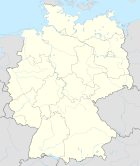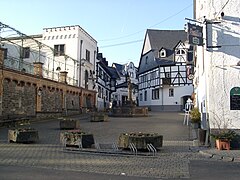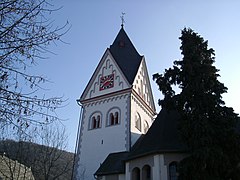Winningen
| coat of arms | Germany map | |
|---|---|---|

|
Coordinates: 50 ° 19 ' N , 7 ° 31' E |
|
| Basic data | ||
| State : | Rhineland-Palatinate | |
| County : | Mayen-Koblenz | |
| Association municipality : | Rhine-Moselle | |
| Height : | 79 m above sea level NHN | |
| Area : | 6.66 km 2 | |
| Residents: | 2421 (Dec. 31, 2019) | |
| Population density : | 364 inhabitants per km 2 | |
| Postal code : | 56333 | |
| Area code : | 02606 | |
| License plate : | MYK, MY | |
| Community key : | 07 1 37 230 | |
| LOCODE : | DE WWG | |
| Association administration address: | Bahnhofstrasse 44 56330 Kobern-Gondorf |
|
| Website : | ||
| Local Mayor : | Rudiger Weyh | |
| Location of the local community of Winningen in the Mayen-Koblenz district | ||
Winningen is a municipality in the Mayen-Koblenz district in Rhineland-Palatinate . It belongs to the Rhein-Mosel community , which has its administrative headquarters in Kobern-Gondorf .
geography
Winningen is located in the conservation area "Moselle area of Schweich to Koblenz" on the lower Mosel between Koblenz-Gül and Gondorf on the left side of the Moselle . The closest cities are on the Moselle Koblenz , about 5 km downstream, and Cochem , about 40 km up the Moselle.
The Distelbergerhof residential area also belongs to Winningen .
history
Winningen was already settled in Roman times. During the construction of the A 61 , the foundations of a villa rustica were discovered near the Moselle valley bridge , which is now enclosed by the loop at the exit to the Moseltal Ost motorway service station.
Winningen was first mentioned in a document from King Ludwig II of October 20, 871 under the name "Uuidinge". When King Arnulf gave the imperial abbey of St. Maximin the "Villa Rübenach " in Mayenfeldgau with its accessories on January 23, 888 , "Uuindiga" was also counted among them. This document from the year 888 is possibly falsified, but Winningen was also later always mentioned in the Maximinischen estates: "Windingun", "Windingis", "Wendenges", "Wendengias".
Goods in Winningen ( wind Inga ) were 1016 Kaiser Heinrich II. The nuns convent Kaufungen given. Knight Hermann von Winningen is mentioned in 1320. He owned one of the oldest documented vineyards, which he received from Count Wilhelm I. von Katzenelnbogen as a fief . These were a vineyard in Winningen in Destil near the garden of Heinrich Kind von Pfaffendorf, a vineyard on the Wolfspfade and a vineyard on the Gire .
The wine witch fountain, surrounded by a half-timbered houses , alludes to the witch trials of the 17th century. Above the village on the Witches Hill , the currently oldest known monument from 1925 commemorates the victims of the witch persecution at this time.
Winningen is traditionally an evangelical enclave in a Catholic (formerly Electorate of Trier ) area. Due to the legal succession of the County of Sponheim , there was a dual rule between Pfalz-Zweibrücken and the Margraviate of Baden until 1776 . Since both gentlemen converted to the new faith during the Reformation , Winningen also became Protestant.
From 1776 until the occupation by French revolutionary troops in 1794, Winningen was in Baden. After the end of the French period it belonged to the Prussian Rhine Province .
In a robbery together with four accomplices, Dieter Freese shot and killed the branch manager of the Sparkasse in Winningen on February 14, 1962 . After a spectacular escape, Freese was caught on March 9, 1962 and sentenced to a long prison term.
- Statistics on population development
The development of the population of Winningen, the values from 1871 to 1987 are based on censuses:
|
|
politics
Municipal council
The municipal council in Winningen consists of 16 council members, who were elected in the local elections on May 26, 2019 in a personalized proportional representation, and the honorary local mayor as chairman. By 2019, the council had 20 council members.
The distribution of seats in the municipal council:
| choice | SPD | CDU | FDP | Green | FBL | total |
|---|---|---|---|---|---|---|
| 2019 | 1 | 5 | 5 | 2 | 3 | 16 seats |
| 2014 | - | 8th | 1 | - | 11 | 20 seats |
| 2009 | - | 6th | 3 | - | 7th | 16 seats |
| 2004 | - | 8th | 4th | - | 8th | 20 seats |
- FBL = Free Citizens List Winningen e. V.
mayor
Rüdiger Weyh (FDP) became local mayor of Winningen on June 25, 2019. In the runoff election on June 16, 2019, he was elected for five years with a 50.50% share of the vote, after none of the original three applicants, including the previous incumbent Eric Peiter (independent), in the direct election on May 26, 2019, had achieved a sufficient majority.
Culture and sights
The winegrowing village has won several village competitions such as “ Our village has a future ” and boasts of being one of the most beautiful villages in Germany . Winningen is also very well known for the " Winninger Moselfest ", the oldest wine festival in Germany, as well as its landmark, the "Winninger Weinhex".
Buildings
- Moselle valley bridge (A 61)
- The Evangelical Parish Church is a baroque hall church from 1695 with a Romanesque east tower.
See also: List of cultural monuments in Winningen
Regular events
The main attraction is the annual ten-day Moselle Festival at the end of August / beginning of September. It is the oldest and, at ten days, the longest wine festival ("Winzerfest") on the Moselle.
Economy and Infrastructure
Viticulture
Winningen is characterized by viticulture , which is operated on terraces above the village. The vineyards are also habitats for rare animals (e.g. Apollo butterflies , lizards ).
The Riesling that grows on the slate terraces is, according to expert judgment, one of the best wines in the world. In 2005 a Winninger Uhlen Laubach Riesling Erste Lage from the Heymann-Löwenstein winery in Paris received the award for the best foreign wine. This winery and the Reinhard and Beate Knebel winery can also be found on the list of the 100 best wineries compiled by the Handelsblatt .
Winningen is part of the "Burg Cochem wine-growing area " in the Moselle growing region . 44 wine-growing businesses are active in the village, and the area under vines is 89 hectares. About 90% of the wine grown are white grape varieties (as of 2007).
- Vineyards (seen downstream from the Moselle)
- Winninger Hamm
- The Winninger Hamm is the smallest single vineyard in Winningen. It is managed by the Rhineland-Palatinate Chamber of Agriculture under the wine region number 440537. The name is said to be derived from the Latin term hammus for river arch or curvature. The Winninger Hamm has a soil structure similar to that of the Winninger Röttgen with the Devonian shale layers, which are criss-crossed by quartzites and clayey soil. The wine is grown here on terraces and on steep slopes.
- Winningen Cathedral Garden
- The name indicates the earlier church property. The Rhineland-Palatinate Chamber of Agriculture has the largest vineyard in Winningen under the vineyard number 440536. The location encompasses the town of Winningen like a frame. There are different floors in the area of the cathedral garden; sandy-loamy layers predominate in the flat areas, and are enriched with slate in the steeper areas. In addition, there are loess and pumice components that optimize the soil for viticulture. Here too, mainly Riesling wines are grown.
- Winninger bridge
- The stones for the Balduin Bridge in Koblenz were broken from this location and transported to Koblenz on ships. The name of this location still reminds of this today. At the Chamber of Agriculture Rhineland-Palatinate it is listed under the wine region number 440535. In addition to clay slate from the Devonian, pumice stone determines the soil. The pumice was deposited as eruptive ash when the Laacher See volcano erupted around 12,000 to 13,000 years ago. This resulted in very permeable soils. The vineyard faces south and south-south-east. Mainly Riesling grapes are grown in terrace viticulture .
- Winninger Röttgen
- The name of the Winninger Röttgen is derived from "clearing". It is listed as a single vineyard with the number 440539 and faces south-southeast. The wines are cultivated here exclusively on the terrace. In addition to slate from the Devonian, the soil also contains quartzite veins and loess components, which are permanently washed away from the upper slope areas. The loess buffers the pH value and thus protects the soil from acidification.
All Winningen vineyards belong to the Weinhex area .
tourism
Another important economic factor is tourism , which benefits from the ship piers and the nearby campsite , which is often frequented by Dutch visitors .
Cologne-Düsseldorf shipping line : Koblenz - Winningen - Treis - Cochem (only on Fridays, Saturdays, Sundays)
Shipping line of the passenger shipping company Gebr. Kolb : Cochem - Treis - Winningen - Koblenz (only on Fridays)
Koblenz-Winningen Airport
The Koblenz-Winningen airfield is used by both sport pilots and business customers. The police helicopter squadron of the state of Rhineland-Palatinate is stationed there.
traffic
The federal road 416 runs along the banks of the Moselle past the village. This connects Koblenz with Treis-Karden and then the federal highway 49 with Cochem. There is a connection to the federal highway 61 via a country road , exit Koblenz-Metternich.
The regional train (Moselle Valley Railway) of the Deutsche Bahn , which runs between Koblenz - Treis-Karden and Trier, stops at Winningen (Mosel) station. There is also a bus from Koblenz to Kobern-Gondorf.
Personalities
Sons and daughters of the church
- Johann Georg Ferdinand Jacobi (1766–1848), lawyer and mayor of Dresden.
- Gottlob Jacobi (1770–1823), entrepreneur
- Karl Wilhelm Arnoldi (1809–1876), doctor and naturalist
- August Horch (1868–1951), car pioneer
- Lothar Krall (1924–2000), politician
- Waltraud AL Jarrold MBE (* 1928), b. Krall, President of the Norfolk & Norwich Koblenz Friendship Association (NNKFA), Region Wine Queen Mosel-Saar-Ruwer (1950/51), Honorary Winemaker (1999), Order of Merit of the State of Rhineland-Palatinate (2002)
- Siglinde Krumme (* 1933), b. Krall, publisher, author, museum director, Federal Cross of Merit 2014
- Horst Schulze (* 1939), Hotelier of the Century (former CEO of Ritz-Carlton , today President of the West Paces Hotel Group) and honorary citizen of Winningen
- Anne von Canal (* 1973), writer and translator
Associated with Winningen
- Johann Daniel Fritzer (* around 1600 in Senheim; † March 1661 in Winningen), Vogt, clerk and mayor
photos
Anton Jahn: Winningen (1838, steel engraving )
literature
- Hans Bellinghausen : Winningen: A German homeland book. 2 volumes. Rheinische Verlagsgesellschaft, 1923 and 1925.
- Marko Kiessel: The Roman villa of Winningen. The Roman villa rustica "Auf dem Bingstel", municipality of Winningen, district of Mayen-Koblenz. Investigations into findings, finds and settlement continuity . Society for Archeology on the Middle Rhine and Moselle / Regional Archeology Directorate Koblenz, Koblenz 2009, ISBN 978-3-9811687-5-4 .
Web links
- Internet presence of the local community Winningen
- Literature about Winningen in the Rhineland-Palatinate state bibliography
Individual evidence
- ↑ State Statistical Office of Rhineland-Palatinate - population status 2019, districts, communities, association communities ( help on this ).
- ↑ State Statistical Office Rhineland-Palatinate (ed.): Official directory of the municipalities and parts of the municipality. Status: January 2019 [ Version 2020 is available. ] . S. 45 (PDF; 3 MB).
- ↑ Reinhard Schindler : Archeology in Need. What is monument preservation? 30 years of archaeological monument preservation in the federal states of Germany . In: Gerd Biegel (Red.): The new image of the old world. Archaeological monument preservation and archaeological excavations in the Federal Republic of Germany from 1945–1975 (= Kölner Römer-Illustrierte, Vol. 2). Römisch-Germanisches Museum, Cologne 1975, pp. 5–11, here p. 9.
- ↑ Christian von Stramberg , Anton Joseph Weidenbach : Memorable and Useful Rheinischer Antiquarius , Volume 17, Part 2, RF Hergt , 1870, p. 569 ( Online at Google Books )
- ↑ 50 years after the robbery: Is "gang boss" Freese still alive? In: Rhein-Zeitung. February 15, 2012, accessed November 28, 2019 .
- ^ A b State Statistical Office Rhineland-Palatinate: My village, my city. Retrieved November 28, 2019 .
- ^ The Regional Returning Officer Rhineland-Palatinate: Local elections 2019, city and municipal council elections.
- ↑ Local community Winningen: minutes of the meeting of the local community council. June 25, 2019, accessed January 17, 2020 .
- ^ The Regional Returning Officer Rhineland-Palatinate: direct elections 2019. see Rhein-Mosel, Verbandsgemeinde, 16th line of results. Retrieved January 17, 2020 .
- ^ Rhein-Zeitung: Runoff election in Winningen: Weyh prevails. June 16, 2019, accessed January 17, 2020 .
- ↑ "Wine Oscar" for Heymann-Löwenstein. Retrieved November 28, 2019 .
- ^ Pit Falkenstein: The 100 best wineries. In: Handelsblatt. Retrieved November 28, 2019 .
- ↑ Joachim Krieger: Terrace culture on the Lower Moselle - the wine-growing locations from Koblenz to Hatzenport with a characterization and classification of all vineyard locations . Krieger, Neuwied 2003, ISBN 3-933104-08-4 .













